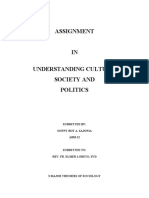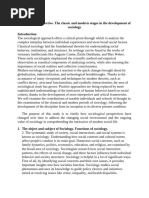0 ratings0% found this document useful (0 votes)
445 viewsFunctionalist
Functionalism interprets each part of society as contributing to social stability. Emile Durkheim viewed society as an organism where each institution plays a necessary role. Examples of core institutions are family, government, economy, and education. From a functionalist view, these institutions depend on each other to fulfill needs and maintain order. While functionalism emphasizes consensus, it has been criticized for justifying the status quo and neglecting negative implications of social order.
Uploaded by
AnonymousCopyright
© © All Rights Reserved
Available Formats
Download as PDF, TXT or read online on Scribd
0 ratings0% found this document useful (0 votes)
445 viewsFunctionalist
Functionalism interprets each part of society as contributing to social stability. Emile Durkheim viewed society as an organism where each institution plays a necessary role. Examples of core institutions are family, government, economy, and education. From a functionalist view, these institutions depend on each other to fulfill needs and maintain order. While functionalism emphasizes consensus, it has been criticized for justifying the status quo and neglecting negative implications of social order.
Uploaded by
AnonymousCopyright
© © All Rights Reserved
Available Formats
Download as PDF, TXT or read online on Scribd
You are on page 1/ 1
Understanding Functionalist Theory
One of the Major Theoretical Perspectives in Sociology
by Ashley Crossman • Updated September 24, 2018
The Careful Balance of Functionalist Theory. Illustration by Hugo Lin. ThoughtCo.
The functionalist perspective, also called functionalism, is one of the major
theoretical perspectives in sociology. It has its origins in the works of Emile
Durkheim, who was especially interested in how social order is possible or how
society remains relatively stable. As such, it is a theory that focuses on the
macro-level of social structure, rather than the micro-level of everyday life.
Notable theorists include Herbert Spencer, Talcott Parsons, and Robert K.
Merton.
Emile Durkheim
"The totality of beliefs and sentiments common to the average members of a
society forms a determinate system with a life of its own. It can be termed the
collective or creative consciousness." The Division of Labour (1893)
Theory Overview
Functionalism interprets each part of society in terms of how it contributes to
the stability of the whole society. Society is more than the sum of its parts;
rather, each part of society is functional for the stability of the whole. Durkheim
actually envisioned society as an organism, and just like within an organism,
each component plays a necessary part, but none can function alone, and one
experiences a crisis or fails, other parts must adapt to fill the void in some way.
Within functionalist theory, the different parts of society are primarily
composed of social institutions, each of which is designed to fill different needs,
and each of which has particular consequences for the form and shape of
society. The parts all depend on each other. The core institutions defined by
sociology and which are important to understanding for this theory include
family, government, economy, media, education, and religion. According to
functionalism, an institution only exists because it serves a vital role in the
functioning of society. If it no longer serves a role, an institution will die away.
When new needs evolve or emerge, new institutions will be created to meet
them.
Let's consider the relationships between and functions of some core
institutions. In most societies, the government, or state, provides education for
the children of the family, which in turn pays taxes on which the state depends
to keep itself running. The family is dependent upon the school to help children
grow up to have good jobs so that they can raise and support their own families.
In the process, the children become law-abiding, taxpaying citizens, who in turn
support the state. From the functionalist perspective, if all goes well, the parts
of society produce order, stability, and productivity. If all does not go well, the
parts of society then must adapt to produce new forms of order, stability, and
productivity.
Functionalism emphasizes the consensus and order that exist in society,
focusing on social stability and shared public values. From this perspective,
disorganization in the system, such as deviant behavior, leads to change
because societal components must adjust to achieve stability. When one part of
the system is not working or is dysfunctional, it affects all other parts and
creates social problems, which leads to social change.
Functionalist Perspective in American Sociology
The functionalist perspective achieved its greatest popularity among American
sociologists in the 1940s and 50s. While European functionalists originally
focused on explaining the inner workings of social order, American
functionalists focused on discovering the functions of human behavior. Among
these American functionalist sociologists is Robert K. Merton, who divided
human functions into two types: manifest functions, which are intentional and
obvious, and latent functions, which are unintentional and not obvious. The
manifest function of attending a church or synagogue, for instance, is to
worship as part of a religious community, but its latent function may be to help
members learn to discern personal from institutional values. With common
sense, manifest functions become easily apparent. Yet this is not necessarily the
case for latent functions, which often demand a sociological approach to be
revealed.
Critiques of the Theory
Functionalism has been critiqued by many sociologists for its neglect of the
often negative implications of social order. Some critics, like Italian theorist
Antonio Gramsci, claim that the perspective justifies the status quo and the
process of cultural hegemony which maintains it. Functionalism does not
encourage people to take an active role in changing their social environment,
even when doing so may benefit them. Instead, functionalism sees agitating for
social change as undesirable because the various parts of society will
compensate in a seemingly natural way for any problems that may arise.
You might also like
- Philippine Political Law - Isagani Cruz 2014 PDF93% (110)Philippine Political Law - Isagani Cruz 2014 PDF1,047 pages
- What Is The Functionalist Perspective in Sociology?100% (2)What Is The Functionalist Perspective in Sociology?3 pages
- Functionalists Believe That Society Is Held Together by Social Consensus, in Which Members of TheNo ratings yetFunctionalists Believe That Society Is Held Together by Social Consensus, in Which Members of The3 pages
- Parsons and Structural Functionalism NotesNo ratings yetParsons and Structural Functionalism Notes10 pages
- Hooria (sapID-2578, Cms-18734) Activity# 2No ratings yetHooria (sapID-2578, Cms-18734) Activity# 215 pages
- Hooria (sapID-2578, Cms-18734) Activity# 2No ratings yetHooria (sapID-2578, Cms-18734) Activity# 215 pages
- Functionalism, or in Some Contexts Structural Functionalism, Is A Broad Perspective inNo ratings yetFunctionalism, or in Some Contexts Structural Functionalism, Is A Broad Perspective in5 pages
- Introducing Sociology (Sociological Theories)No ratings yetIntroducing Sociology (Sociological Theories)23 pages
- Theoretical Foundations of Culture, Society and PoliticsNo ratings yetTheoretical Foundations of Culture, Society and Politics25 pages
- San Juan Structural and Steel Fabricators, Inc. vs. CA, 296 SCRA 631100% (1)San Juan Structural and Steel Fabricators, Inc. vs. CA, 296 SCRA 63119 pages
- Natural Law: Jurist As The Well-Know Question What Is Truth?' Is To The LogicianNo ratings yetNatural Law: Jurist As The Well-Know Question What Is Truth?' Is To The Logician1 page
- Case Digests Ni Kat: Tag Archives: People v. MojelloNo ratings yetCase Digests Ni Kat: Tag Archives: People v. Mojello1 page
- Rahman Momin (1972) - The Facade of ObjectivityNo ratings yetRahman Momin (1972) - The Facade of Objectivity9 pages
- Critical Discourse Analysis: Demystifying The Fuzziness: October 2015No ratings yetCritical Discourse Analysis: Demystifying The Fuzziness: October 20159 pages
- Subject Name Paper Name Module Name/Title Pre-Requisites: KeywordsNo ratings yetSubject Name Paper Name Module Name/Title Pre-Requisites: Keywords14 pages
- Mesopartner Working Paper 08 / 2005: How To Promote ClustersNo ratings yetMesopartner Working Paper 08 / 2005: How To Promote Clusters50 pages
- (Semiotics and Popular Culture) Aleksei Semenenko (Auth.) - The Texture of Culture - An Introduction To Yuri Lotman's Semiotic Theory-Palgrave Macmillan US (2012) PDF100% (2)(Semiotics and Popular Culture) Aleksei Semenenko (Auth.) - The Texture of Culture - An Introduction To Yuri Lotman's Semiotic Theory-Palgrave Macmillan US (2012) PDF187 pages
- Sample Document Linguistics For Non-Linguists PDFNo ratings yetSample Document Linguistics For Non-Linguists PDF43 pages
- Social Relations and Spatial StructuresNo ratings yetSocial Relations and Spatial Structures10 pages
- Chapter 8 Scott Institutions and Organizations 4e 2 PDFNo ratings yetChapter 8 Scott Institutions and Organizations 4e 2 PDF41 pages
- Media Represents Different Social GroupsNo ratings yetMedia Represents Different Social Groups8 pages
- Full Download Sociology Work and Industry Fifth edition Tony J. Watson PDF DOCX100% (5)Full Download Sociology Work and Industry Fifth edition Tony J. Watson PDF DOCX81 pages
- Ahmed (Happy Objects), Massumi (Politics of Threat), Probyn (Shame) - Unknown TitleNo ratings yetAhmed (Happy Objects), Massumi (Politics of Threat), Probyn (Shame) - Unknown Title33 pages
- Ebanna Lucelle M. Redublo Sociology of Theater BPEA 2-1 Prof. Leo Francis CabralNo ratings yetEbanna Lucelle M. Redublo Sociology of Theater BPEA 2-1 Prof. Leo Francis Cabral1 page











































































































